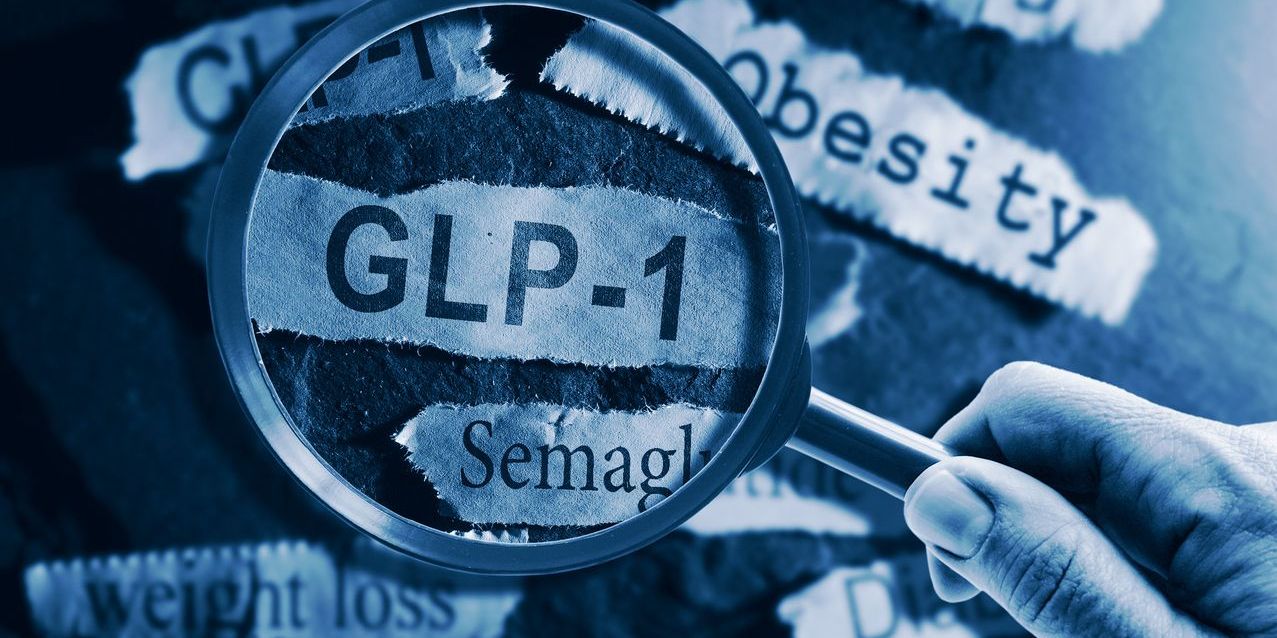Summary: Yes, preliminary evidence shows that weight loss drugs may help treat addiction. The medications, called glucagon-like peptide-1 receptor agonists (GLP-1RAs), are currently approved by the Food and Drug Administration for type 2 diabetes, obesity, and obstructive sleep apnea.
Key Points:
- Some medications for alcohol use disorder (AUD) and substance use disorder (SUD), a.k.a. alcohol addiction and drug addiction, also have an impact on appetite and weight.
- Naltrexone, approved for the treatment of AUD and SUD, may be combined with bupropion as an anti-obesity medication.
- Topiramate, an ant-seizure medication, is used off-label for weight loss, and is also endorsed by the American Psychiatric Association for treating AUD
- Scientists indicate that overlapping brain mechanisms are associated with addiction and obesity, warranting further research.
Addiction and Obesity: Two Public Health Challenges.
In recent weeks, the news media has been full of stories about increasing rates of obesity in the U.S., and how new guidelines and definitions related to obesity may mean that far more people in the U.S. meet criteria for obesity than experts previously believed.
For instance, the study “Implications of a New Obesity Definition Among the All of Us Cohort” shows that in a review of 301,026 adults from the All of Us Survey (AoU):
- 206,361 people (68.6%) met criteria for obesity under the new definition
- 128,992 (42.9%) met criteria for obesity under the older, traditional definition
That’s a 60 percent increase in the number of people with obesity under the new definition, which includes both body mass index (BMI) measurements and several anthropomorphic measurements, i.e. measurements of waist circumference, waist-to-hip ratio, and waist-to-height ratio. Health experts advocate inclusion of body measurements because tissue adiposity, or the amount of fat in specific areas of the body, predict risk of several cardiometabolic diseases more accurately than BMI.
The upshot of that information is that under the new guidelines, close to 40 percent of participants in the AoU survey, which is representative of the entire U.S. population, meet criteria for obesity. Extending this to the adult population of the U.S. would elevate obesity from a public health problem to a level nearing a public health crisis.
With regards to addiction, data on the prevalence of alcohol use disorder and substance use disorder from the 2024 National Survey on Drug Use and Health (2024 NSDUH) show the following:
ADU/SUD: 2024 NSDUH
- Alcohol use disorder: 27.9 million
- Illicit drug use disorder: 28.2 million
- Opioid use disorder: 4.8 million
- Marijuana use disorder: 20.0 million
- Stimulant use disorder: 4.3 million
- Tranquilizer/sedative use disorder: 2.1 million
While most people with a cardiometabolic disease associated with obesity take medication for their condition, and close to 15 million people have a prescription for a GLP-1a class medication, less than 2 percent of people with AUD take a medication designed to treat AUD – that’s about half a million, out of the nearly 28 million people with AUD.
Therefore, when scientists realized that obesity and addiction – particularly alcohol addiction – affect many of the same brain areas and systems, meaning their action in the brain overlaps, researching the impact of GLP-1a drugs such as Wegovy and Ozempic on addiction makes is perfectly logical.
If these weight loss dugs can really help people with addiction, then they could help millions. Let’s see what the research says.
Weight Loss Drugs and Addiction: New Research Shows Promise
In October 2025, a group of researchers published a study called “GLP-1 Therapeutics and Their Emerging Role in Alcohol and Substance Use Disorders: An Endocrinology Primer,” which assesses whether weight loss drugs in the GLP-1 class have a positive impact on people with AUD or SUD.
To date, most research on whether weight loss drugs really help treat addiction involve research on GLP-1RAs for alcohol use disorder. After a thorough review of all available research, the preliminary evidence from rodent and non-human primate studies shows:
- Decreased alcohol seeking behavior
- Decreased alcohol intake
- Reduced levels of addiction-related neurotransmitters
- Reduced acquisition of self-administration, i.e. addiction
Studies of GLP-1RA on opioid use disorder (OUD) in rodent models show:
- Decreased acquisition of self-administration for heroin, fentanyl, and oxycodone
- Decreased reinstatement of self-administration for heroin, fentanyl, and oxycodone
- Reduced acquisition and reinstatement of drug-seeking behavior
In humans with alcohol use disorder (AUD), a new study shows that low-dose GLP-1RA:
- Reduced self-administration, i.e. addictive behavior
- Reduced number of drinks on drinking days
- Decreased alcohol cravings
- Predicted reductions in heavy drinking over time
Those are positive and promising outcomes. They take on more weight when we consider new research that highlights the health risks of alcohol and show that even moderate alcohol consumption increases risk of severe, long-term health problems, including cancer.
Here’s how the study authors characterize their findings:
“Preclinical and early clinical investigations suggest that GLP-1RAs modulate neurobiological pathways underlying addictive behaviors, thereby potentially reducing substance craving and use while simultaneously addressing comorbid conditions.”
What that means in plain language is that weight loss drugs act on the same brain areas and mechanisms as areas associated with addiction, indicating that they may help resolve addictive behaviors while simultaneously helping to manage conditions such as obesity.
How This Information Helps
If we discover – after extensive trials on humans with addiction – that the new generation of weight loss drugs can reduce cravings for alcohol and drugs, as well as reduce overall intake of alcohol and drugs, then that discovery can open up a new avenue of hope for people with addiction.
As most people know, alcohol use disorder and substance use disorder are chronic, long-term medical conditions associated with a high rate of relapse. For the millions of people for whom current approaches to addiction treatment are ineffective, a new medication that can reduce cravings and reduce rates of relapse could be life changing. We’ll keep an eye on the research, and report any developments here as soon as we learn anything new.
Angus Whyte has an extensive background in neuroscience, behavioral health, adolescent development, and mindfulness, including lab work in behavioral neurobiology and a decade of writing articles on mental health and mental health treatment. In addition, Angus brings twenty years of experience as a yoga teacher and experiential educator to his work for Crownview. He’s an expert at synthesizing complex concepts into accessible content that helps patients, providers, and families understand the nuances of mental health treatment, with the ultimate goal of improving outcomes and quality of life for all stakeholders.


 Myriame Nicolas, PMHNP-BC
Myriame Nicolas, PMHNP-BC Charlie Perez, PMHNP-BC
Charlie Perez, PMHNP-BC Kelvin Poon, MSN, PMHNP-BC
Kelvin Poon, MSN, PMHNP-BC


 Apneet Mann, FNP-C
Apneet Mann, FNP-C Kimberly Umansky, FNP-C
Kimberly Umansky, FNP-C Joanne Talbot Miller, M.A., LMFT
Joanne Talbot Miller, M.A., LMFT Rachael Hueftle, NP
Rachael Hueftle, NP J. Heather Fitzpatrick, LCSW
J. Heather Fitzpatrick, LCSW Agata Nowakowska
Agata Nowakowska Brianna Meacham
Brianna Meacham Maha Moses, PhD
Maha Moses, PhD Rebecca McKnight, PsyD
Rebecca McKnight, PsyD Tiffany Holm N.P.
Tiffany Holm N.P. Dede Echitey, PMHNP-BC
Dede Echitey, PMHNP-BC


